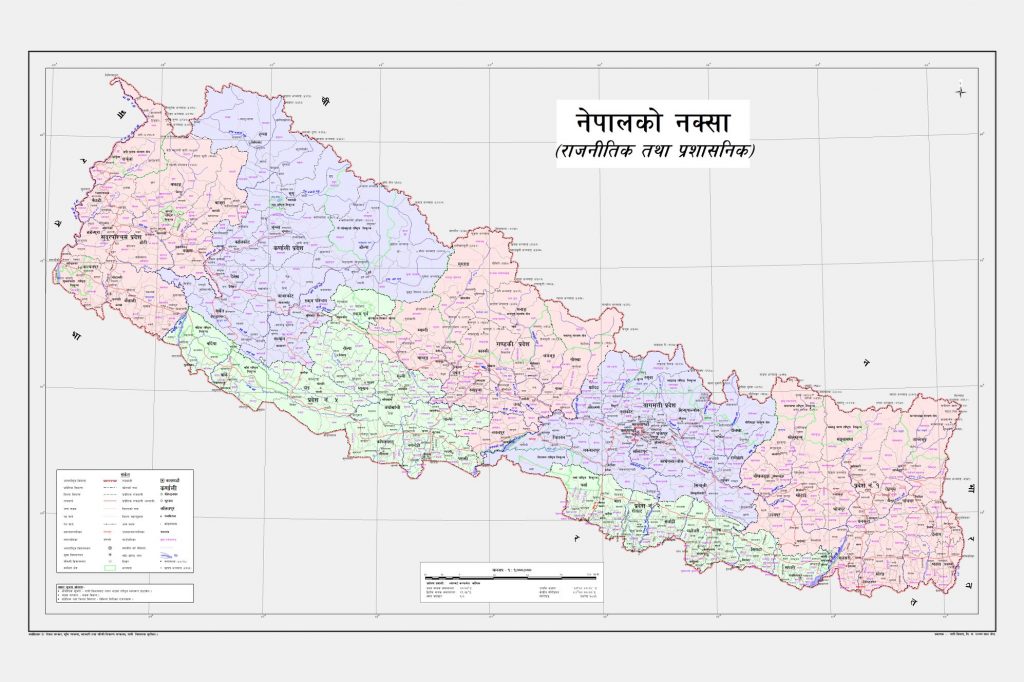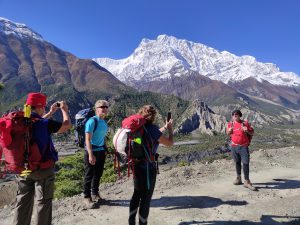
With President Bidya Devi Bhandari refusing to authenticate the controversial citizenship bill as mandated by the 2015 constitution of Nepal, there are many questions about her role. Some experts and stakeholders have commented that it was an attack on the constitution.
But, President Bhandari is not alone as there have been several such incidents in the past also.
When Nepal drafted the new Constitution of Nepal in 2015, almost all political parties were on the same page. Seven years on, all these parties have gone in different directions. The parties never worked together. Neither did their ideologies match. What is even worse is that the parties did not even try to compete with integrity.
In the past seven years, these very people have belittled the constitution of Nepal and attacked it. Even the stakeholders know this as they have not followed what is written in the constitution for their political gain.
Today, on the occasion of the seventh Constitution Day that Nepal marked on September 19, 2022, we look at seven ways in which the constitution of Nepal has been attacked, belittled and abused by those in power.
1. Dissolution of the House

On December 20, 2020, when then Prime Minister KP Sharma Oli dissolved the House of Representatives, even people from his own party were shocked as there was no provision to do so in the 2015 constitution of Nepal.
After his first attempts failed, Oli dissolved the House yet again the next year, leading to his downfall in the end.
Why did he do so? The answer was simple to stay in power. The erstwhile NCP was in turmoil and it was almost certain that Oli would not have a majority if the party voted for its next leader. To ensure that did not happen and he did not lose his position as the chair, he dissolved the House calling for early elections. His move was supported by the president too.
People moved to court calling the move unconstitutional. The Supreme Court voided the decision by Oli calling it an attack on the constitution of Nepal and reinstated the House second time in six months.
2. Issues with inclusiveness

The constitution of Nepal is based on inclusivity. The constitution has clearly stated that all government bodies and mechanisms should be inclusive. But, when it comes to appointing officials or electing them, the principle of inclusivity has not been followed.
Every time there is an election, the parties that claim to be inclusive never follow their manifesto or principles. Female ministers are a rarity. Even in the House, there is no inclusivity. The local level has also not been able to have people from all communities which is a major cause for concern.
The case is similar when it comes to appointing people to constitutional bodies. Even the National Inclusion Commission has never been inclusive and a few weeks ago, it even suggested the government remove the reservation practice.
The judiciary, which forces people to follow the constitution of Nepal, does not follow what is written in it. The courts have a major issue with inclusivity when it comes to the appointment of judges.
When Prakash Nepali and a few others filed a writ petition at the Supreme Court, asking for inclusiveness during the appointment of judges, the court said the judiciary cannot look at inclusivity as it prioritises competence when hiring judges. Justices Tej Bahadur KC and Bam Kumar Shrestha said that if the court focused on inclusiveness, the system would suffer.
Due to this thought process, the Supreme Court only has two female justices. One other has been recommended, but when she will be appointed remains to be seen.
“The presence of people marginalised communities [in state affairs] is increasing. And, we should take this positively,” says Rekha Sharma, a member of the State Affairs Committee of the recently expired House of Representatives. “But, yes, a lot of government bodies don’t follow the principle of inclusiveness and that needs to improve in the long run.”
3. Foundation-shaking ordinances

When the House is on a break, there might come a time when the ruling government has to come up with new legal provisions. With this in mind, the constitution of Nepal has the provision for ordinances. The ordinance can last only six months, after which it will have to be endorsed by the House in the following session.
But, over the past few years, the government prorogues the parliament and issues ordinances whenever it feels it cannot face the house with the proposed law. It happens because the propositions are based not on necessity but on their power interests. Consider the ordinances to amend key political laws such as the Constitutional Council Act, the Act on Political Parties and the Citizenship Act. Not only KP Sharma Oli, but Sher Bahadur Deuba has also done the same.
“Was there a need for these ordinances? I don’t think so,” says advocate Raju Prasad Chapagain. “These were done to bring something in a swift manner as they were afraid that others will oppose.”
4. Weak federalism

The governments that came to power following the promulgation of the new federal constitution of Nepal have never been a fan of federalism. None of them has been able to develop both the local and provincial levels of the government. They have not been able to balance the workforce at either the local or the provincial level.
Outgoing parliamentarian Rekha Sharma says that due to disputes between different levels of the government, they have not been able to implement the laws properly. Even the laws mentioned in the constitution of Nepal have not been implemented, questioning if federalism really works in the country.
Sharma says this is the reason why the draft of the federal civil service bill has not been presented to the House of Representatives.
“Dispute among government officials is a reason why the bill hasn’t been able to move forward,” she says.
With no federal laws, it has been impossible to efficiently manage federalism in the country. Even fundamental rights have not been implemented well.
5. Citizenship issues

The constitution of Nepal states that no Nepali citizen is barred from obtaining a citizenship certificate. But, in the past seven years, this has been limited to paper alone. Even though one whole term of the House of Representatives has been over, there still has not been a consensus when it comes to a bill to amend the Citizenship Act. The bill was passed by both houses despite objections from the CPN-UML.
The constitution of Nepal states that anyone whose father and mother were Nepalis would get citizenship by descent. But, since there are no laws for children born to citizens by birth, a lot of people have not been able to get their citizenship.
“There are people who have registered writ petitions at the Supreme Court. They got their citizenship, but others still wait for what will be their fate,” says senior advocate Mira Dhungana.
She says politicians are playing politics with the future of people and it is wrong. “How fair is it that these people have to fight for their constitutional rights,” she questions.
6. Constitutional bodies becoming job hubs
For the purpose of checks and balances, the constitution of Nepal has envisioned various constitutional bodies. These bodies include the Election Commission to the Commission for the Investigation of Abuse of Authority. But, people are not appointed fairly in these bodies.
Over the course of history, these bodies have become places where those in power send their aides or cadres. This means these bodies have not been able to work efficiently to implement the constitution of Nepal. There was a time even Chief Justice Cholendra Shamsher Rana asked for a share to send his person to the cabinet. PM Oli once brought the Constitutional Council Ordinances and appointed 52 officials as he pleased.
7. Lack of a fair jurisprudential practice

They say interpretation gives life to a constitution. But, the Supreme Court which is there to interpret the constitution of Nepal in the correct manner has time again failed it. Different cases related to the constitution are still at the Supreme Court. When will they be heard is anyone’s guess.
Cases like the jurisdiction of the federal, local and provincial governments and election issues are still at the court awaiting a date for hearing. It has also not been able to publish the full text of the verdicts on some of the settled cases.
The constitutional bench of the Supreme Court, established as mandated by the constitution of Nepal, has been seen as useless in recent times. The bench has not been holding regular meetings and even when it does, it has not been able to act fast questioning its existence.
The cases filed questioning the results of the 2017 elections have not been solved even as the term of the lawmakers has ended. How the court has not been able to prioritise it has been quite shocking to all as it is most likely that these cases will be heard only after the next elections in November.
This story was translated from the original Nepali version and edited for clarity and length.


























